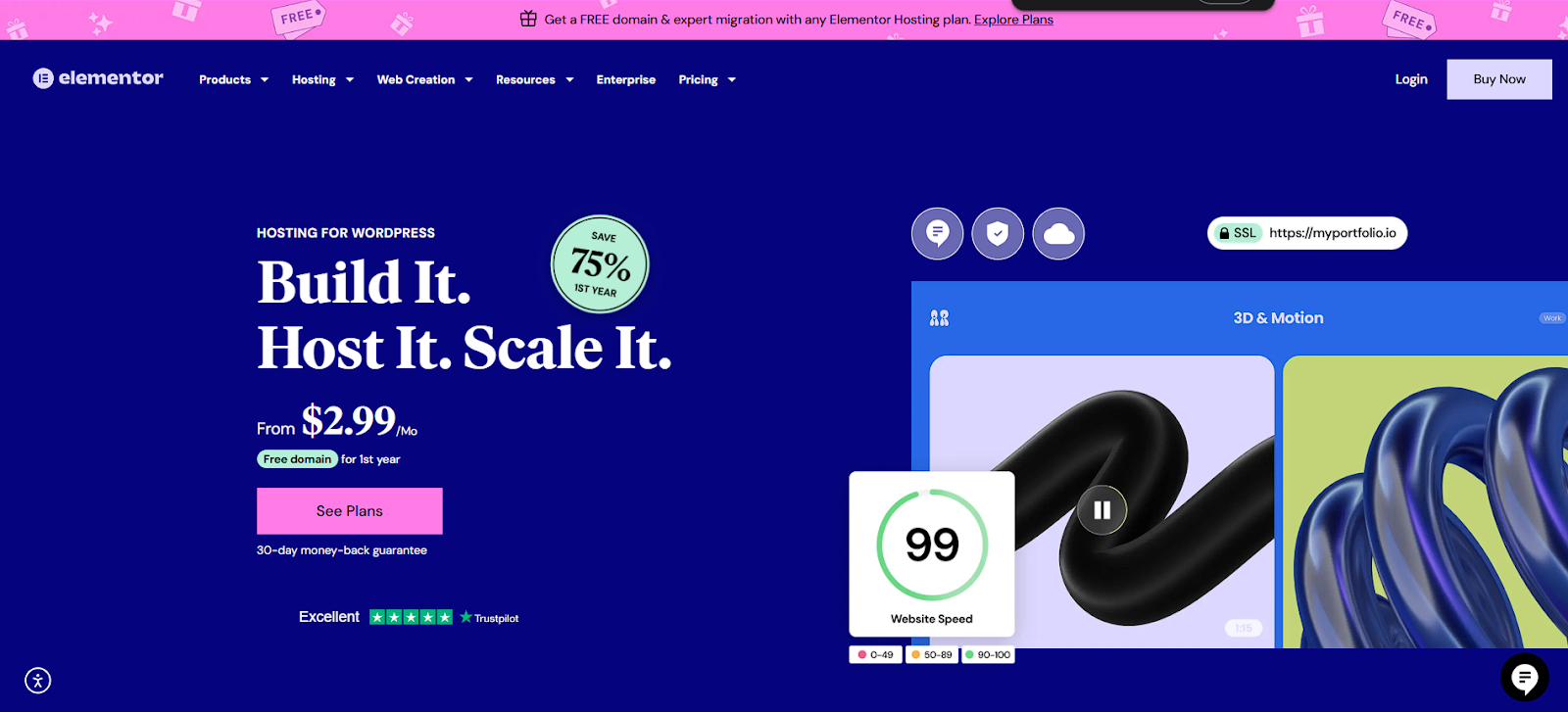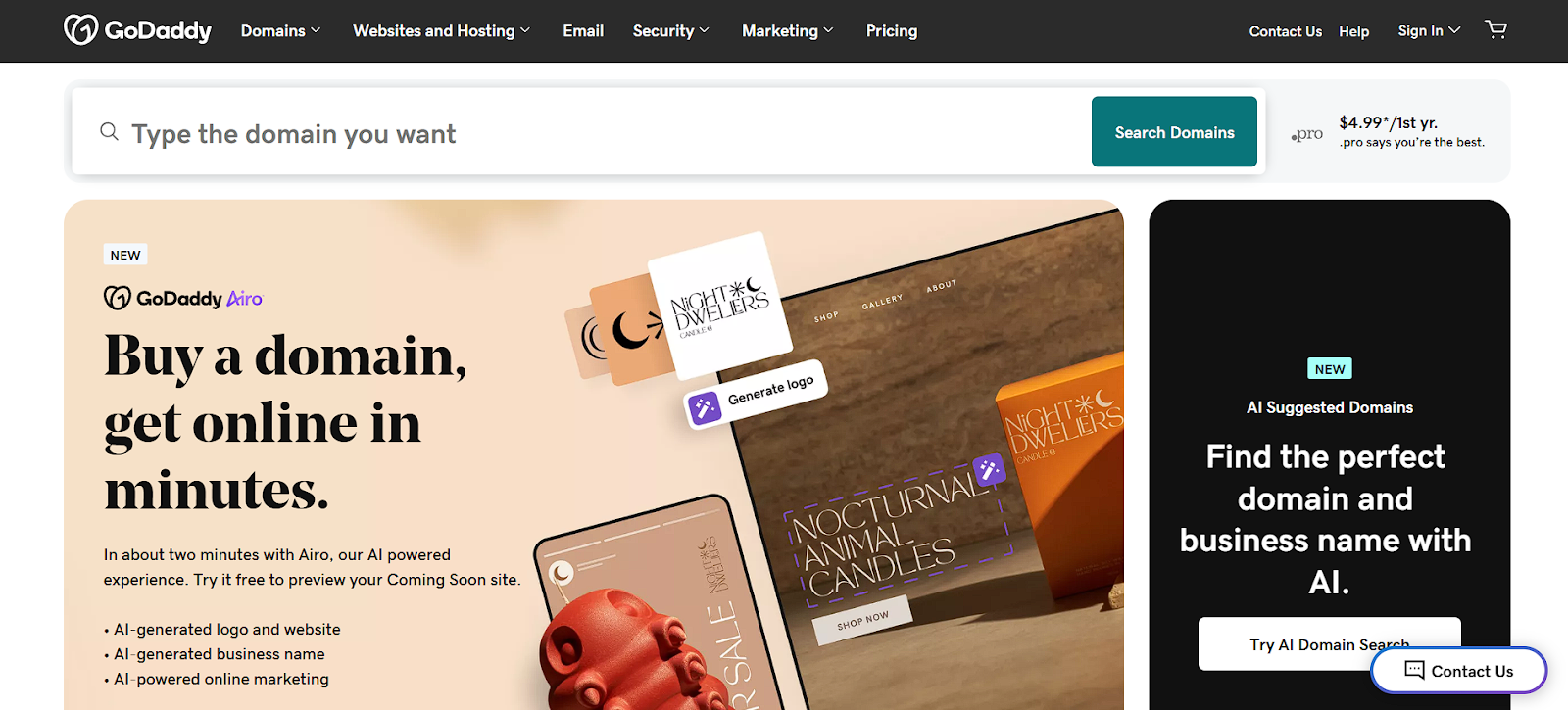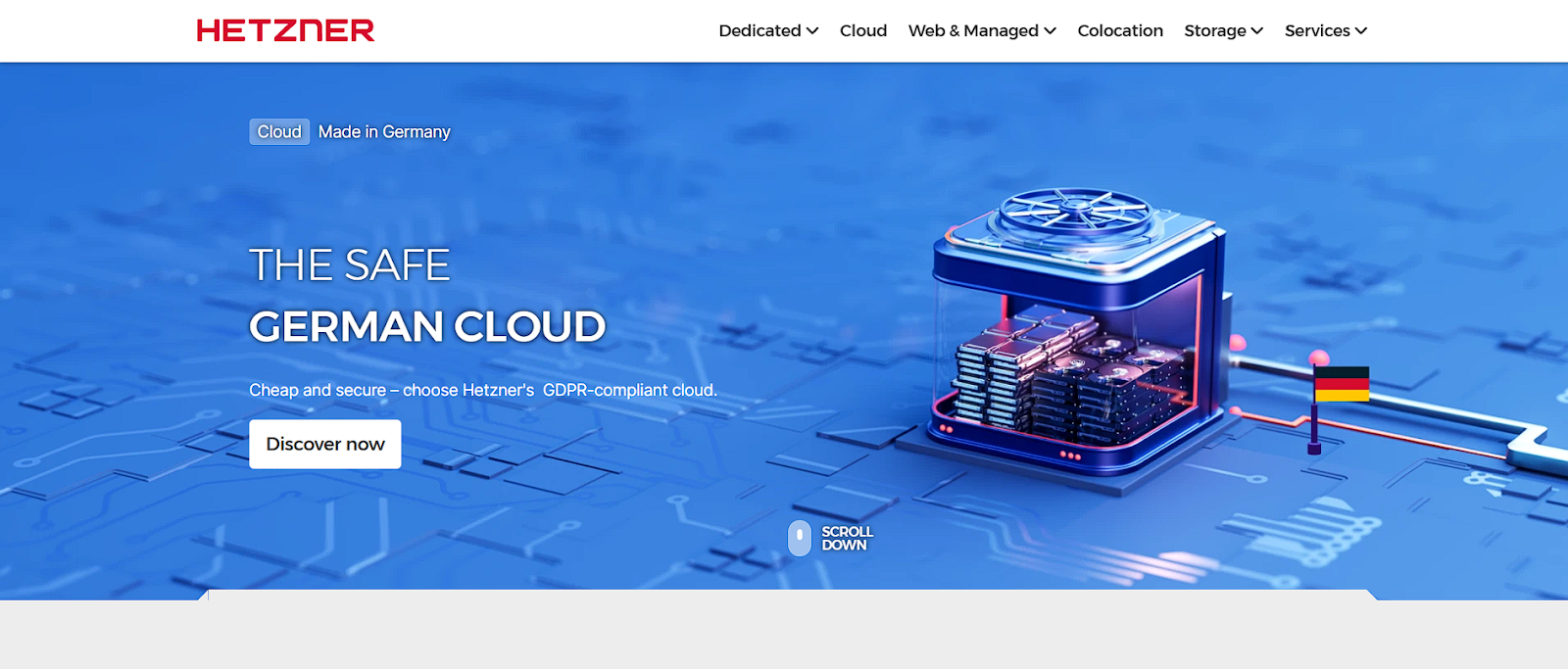A solid foundation helps your site run smoothly and stay online. With so many options available, how do you choose the best fit for your needs?
This guide explores three popular choices: GoDaddy, Hetzner Online, and Elementor Hosting, helping you understand what each offers.
GoDaddy vs Hetzner Online vs Elementor Hosting
Let’s look at how these three providers stack up. We’ll examine their features, strengths, and who might find them most suitable.
Elementor Hosting: All-in-One Solution for WordPress Websites
Elementor Hosting provides a managed hosting environment built specifically for WordPress websites, especially those created with the Elementor builder. It focuses on delivering speed, security, and a streamlined workflow.

- Features: Managed WordPress hosting built on powerful Google Cloud Platform (C2) infrastructure. Includes the Elementor Core builder (free version). Provides lightning-fast speed with features like Enterprise Cloudflare CDN, advanced caching options, and Zero Handshake TLS. Security is robust with a free Premium SSL certificate, automated daily backups, WAF (Web Application Firewall), DDoS & BotNet protection, multi-factor authentication readiness, and 24/7 security monitoring.
https://www.youtube.com/watch?v=cmx5_uThbrM
Offers convenient tools like a file manager, SFTP access, free migration, and a free domain name for the first year. Features built-in auto-scaling using Kubernetes (GKE) technology to handle traffic surges automatically. - Benefits: Delivers excellent performance and reliability optimized for WordPress and Elementor. Offers multiple layers of security built-in, protecting your site and visitors. Simplifies website setup and management with integrated tools and expert 24/7 support. Handles traffic peaks smoothly with automatic scaling. Provides significant value with included premium features like CDN, SSL, domain, and migration.
- Key Strengths: Deep integration with the Elementor ecosystem. High-performance foundation using Google Cloud and Cloudflare CDN. Comprehensive, enterprise-grade security features included out-of-the-box. Automatic scaling technology ensures high availability during traffic surges. Offers an all-inclusive package simplifying the hosting experience for Elementor users.
- Potential Considerations: Primarily designed for WordPress websites using Elementor. Elementor Pro’s advanced features require a separate purchase, as the hosting package includes the free Elementor Core builder.
- Who is it Best For? Individuals, designers, and businesses using Elementor for their WordPress sites. Users seeking top performance, strong security, and reliable support within an integrated Elementor environment. Anyone wanting a managed solution that handles technical aspects like scaling and security automatically.
GoDaddy

GoDaddy is a well-known name in the domain registration and web hosting industry. They offer a wide array of services beyond just hosting.
- Features: Offers various hosting types (shared, VPS, dedicated), domain registration, website builder tools, email hosting, and online marketing services. Provides different tiers for hosting plans with varying resources. Includes a control panel for management.
- Benefits: Offers a broad range of web services in one place. Caters to different hosting needs and budgets. Established company with extensive infrastructure. Provides domain registration alongside hosting.
- Key Strengths: Large product portfolio including domains and marketing tools. Recognizable brand name. Offers hosting options suitable for various website types beyond WordPress. Global data center presence.
- Potential Considerations: The range of products can sometimes feel overwhelming. Hosting performance can vary depending on the chosen plan.
- Who is it Best For? Beginners looking for a wide range of services under one roof. Businesses needing domain registration, hosting, and email bundled together. Users exploring different types of hosting beyond just WordPress.
Hetzner Online

Hetzner Online is a German hosting provider known for offering powerful hardware at competitive price points, particularly popular in Europe.
- Features: Provides shared hosting, managed servers, dedicated servers, and cloud solutions. Focuses on delivering strong hardware performance. Offers options with NVMe SSD storage. Includes features like DDoS protection and backups depending on the plan.
- Benefits: Excellent performance for the price. Offers robust dedicated and cloud server options. Known for reliable infrastructure. Provides choices for technically proficient users.
- Key Strengths: High-performance hardware, especially dedicated and cloud servers. Competitive pricing structure. Strong presence and reputation in Europe. Focus on core hosting performance.
- Potential Considerations: Primarily targets a European audience, though services are available globally. The interface and support might lean towards more technical users for advanced products.
- Who is it Best For? Price-conscious users needing high-performance servers. Developers and agencies looking for powerful dedicated or cloud resources. European businesses prioritizing local data centers.
Grow Your Sales
- Incredibly Fast Store
- Sales Optimization
- Enterprise-Grade Security
- 24/7 Expert Service

- Incredibly Fast Store
- Sales Optimization
- Enterprise-Grade Security
- 24/7 Expert Service
- Prompt your Code & Add Custom Code, HTML, or CSS with ease
- Generate or edit with AI for Tailored Images
- Use Copilot for predictive stylized container layouts

- Prompt your Code & Add Custom Code, HTML, or CSS with ease
- Generate or edit with AI for Tailored Images
- Use Copilot for predictive stylized container layouts
- Craft or Translate Content at Lightning Speed
Top-Performing Website
- Super-Fast Websites
- Enterprise-Grade Security
- Any Site, Every Business
- 24/7 Expert Service

Top-Performing Website
- Super-Fast Websites
- Enterprise-Grade Security
- Any Site, Every Business
- 24/7 Expert Service
- Drag & Drop Website Builder, No Code Required
- Over 100 Widgets, for Every Purpose
- Professional Design Features for Pixel Perfect Design

- Drag & Drop Website Builder, No Code Required
- Over 100 Widgets, for Every Purpose
- Professional Design Features for Pixel Perfect Design
- Marketing & eCommerce Features to Increase Conversion
- Ensure Reliable Email Delivery for Your Website
- Simple Setup, No SMTP Configuration Needed
- Centralized Email Insights for Better Tracking

- Ensure Reliable Email Delivery for Your Website
- Simple Setup, No SMTP Configuration Needed
- Centralized Email Insights for Better Tracking

- Ensure Reliable Email Delivery for Your Website
- Simple Setup, No SMTP Configuration Needed
- Centralized Email Insights for Better Tracking
Selecting the Best Hosting Plan for You
Choosing the right host involves more than just comparing providers. You need to match a plan to your specific requirements. Let’s explore key factors.
Matching Hosting to Your Website Needs
What kind of website are you building? If you’re using WordPress, especially with a builder like Elementor, hosting optimized for that environment makes sense. WooCommerce sites often need more resources than simple blogs. Clearly define your website’s purpose and technical needs first. Think about traffic expectations and required features.
Also, consider your future plans. Will your site grow significantly? Choose a host and plan that allows easy scaling. Moving later can be complex, so planning for growth saves headaches.
Balancing Budget and Performance
Hosting costs vary widely. Define your budget, but don’t sacrifice essential features for price alone. Reliability is key; frequent downtime drives visitors away. Look for providers with strong uptime guarantees (often 99.9%).
Faster storage, like NVMe SSDs, significantly improves website loading speed. Many modern hosts offer this. Assess if the performance boost justifies any extra cost for your specific needs.
Support and Ease of Use
Problems can arise anytime. Access to 24/7 expert support is incredibly valuable, especially if you aren’t highly technical. Check the support channels offered (phone, chat, tickets) and their reputation.
An intuitive control panel (like cPanel, Plesk, or a custom dashboard) simplifies managing your hosting account, domains, emails, and files. A user-friendly interface makes routine tasks much easier.
Key Factors for Smooth Hosting Migration
Moving your website to a new host requires careful planning. Let’s break down the process.
Planning Your Website Move
First, understand the steps involved in transferring your website data. This usually means backing up your files and database from the old host and uploading them to the new one. Many hosts offer tools or services to help with this.
Decide how to handle your domain name. You can transfer it to the new host or keep it with your current registrar and update the DNS settings to point to the new server. Consider where you want to host your emails. You might keep them with your domain registrar, use the new host, or use a third-party service.
Minimizing Disruption During Migration
The main goal during migration is to prevent downtime. Plan the switch during off-peak hours. Test everything thoroughly on the new host before updating your domain’s DNS records.
Look for hosts offering simple one-click migration tools or migration assistance. These services can automate much of the process, reducing errors and speeding things up. Always double-check the migration results.
Boosting Site Performance on New Hosting
Once migrated, take steps to ensure your site runs optimally on its new platform.
Optimizing Your Site on New Hosting
Explore performance tuning tactics specific to your new hosting environment. This might involve server-level adjustments or optimizing your website’s code and images. Utilize caching mechanisms provided by your host or through plugins.
A Content Delivery Network (CDN) stores copies of your site in various locations globally, speeding up access for international visitors. Hosting built on cloud infrastructure often provides better scalability and resilience compared to traditional shared hosting. Don’t forget regular maintenance; keep your website software, themes, and plugins updated.
Essential Web Hosting Security Measures
Website security is non-negotiable. Your host plays a vital role, but site security is a shared responsibility.
Foundational Security Practices
Ensure your site uses SSL/HTTPS to encrypt data between visitors and your server. Most reputable hosts provide free SSL certificates. Configure hosting firewall rules to block malicious traffic before it reaches your site. Perform regular security checks using scanners or plugins to identify vulnerabilities.
Backup and Recovery Essentials
Implement a robust backup strategy. Your host likely offers backups, but consider keeping your own off-site copies too. Have a disaster recovery plan in place so you know how to restore your site quickly if the worst happens.
Advanced Threat Protection
A Web Application Firewall (WAF) filters and monitors traffic, blocking common attacks. Look for hosting that includes WAF protection or consider adding a service like Cloudflare. DDoS mitigation protects your site from being overwhelmed by malicious traffic floods. BotNet defense helps block automated spam and hacking attempts.
Access and Authentication Security
Enable Multi-Factor Authentication (MFA) on your hosting account and website admin login for an extra layer of security. Use secure methods for database and file transfer access, like SFTP instead of FTP. Zero Handshake TLS is a newer security feature that speeds up secure connections without compromising safety.
Proactive Maintenance and Monitoring
Choose hosting with 24/7 security monitoring to detect and respond to threats quickly. Automatic software updates and automatic security patch management for the server environment help close vulnerabilities promptly. Using separate Dev/Stage/Prod environments allows you to test changes safely before deploying them to your live site, reducing security risks.
What’s Next for the Web Hosting Industry
The hosting landscape is constantly evolving. Here’s a glimpse into the future.
The Evolving Web Hosting Landscape
We’re seeing new hosting technologies emerge, focusing on speed, efficiency, and security. There’s a growing emphasis on sustainability, leading to more eco-friendly data centers and green energy hosting servers powered by renewable sources.
AI and automation are increasingly used in hosting management for tasks like resource allocation, security monitoring, and customer support, aiming to improve efficiency and reliability.
Conclusion
Choosing the right web host is fundamental to your online success. Consider your specific needs, budget, and technical comfort level. Evaluate factors like performance, security, support, and scalability.
For those building websites with WordPress, particularly using the Elementor page builder, Elementor Hosting presents a compelling option. It offers a managed environment optimized specifically for this ecosystem.
By integrating hosting with the tools you already use, it aims to streamline the website creation and management process, backed by robust cloud infrastructure. Carefully weigh its features against your project requirements to see if it’s the ideal foundation for your website.
Looking for fresh content?
By entering your email, you agree to receive Elementor emails, including marketing emails,
and agree to our Terms & Conditions and Privacy Policy.

